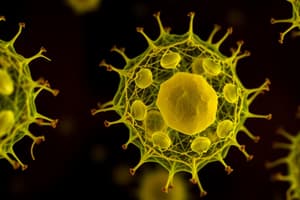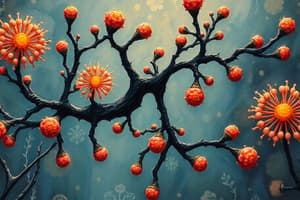Podcast
Questions and Answers
What is the most basic level of biological organization?
What is the most basic level of biological organization?
- Atom (correct)
- Cell
- Tissue
- Molecule
Which biological level of organization consists of a group of similar cells that perform a specific function?
Which biological level of organization consists of a group of similar cells that perform a specific function?
- Tissue (correct)
- System of organs
- Organ
- Organism
What is the study of the formation and development of organisms?
What is the study of the formation and development of organisms?
- Physiology
- Genetics
- Biochemistry
- Embryology (correct)
Which branch of biology deals with the naming and classifying of organisms?
Which branch of biology deals with the naming and classifying of organisms?
What is the term for a group of organisms of the same species that live in the same geographical area?
What is the term for a group of organisms of the same species that live in the same geographical area?
What is the study of the interactions between organisms and their environment?
What is the study of the interactions between organisms and their environment?
The atom is the most complex level of biological organization.
The atom is the most complex level of biological organization.
Cytology is the study of the external structure of organisms.
Cytology is the study of the external structure of organisms.
Macromolecules are composed of a single molecule.
Macromolecules are composed of a single molecule.
The ecosystem includes interactions between living organisms only.
The ecosystem includes interactions between living organisms only.
The branch of biology that deals with the study of heredity and variation is ecology.
The branch of biology that deals with the study of heredity and variation is ecology.
The bioma is the smallest level of biological organization.
The bioma is the smallest level of biological organization.
Study Notes
Biological Levels of Organization
- Atom: the building block of matter, making up all material in the universe
- Molecule: a group of atoms, including macromolecules like carbohydrates, proteins, nucleic acids, and lipids
- Cell organelles: components that make up cells
- Cell: the basic structural and functional unit of life
- Tissue: a group of similar cells
- Organ: a group of tissues that perform a specific function
- System of organs: a group of organs that work together to maintain homeostasis
- Organism: an individual living thing
- Population: a group of the same species living in the same geographical area
- Community/Biocenoses: a group of different species living together
- Ecosystem: the interaction between organisms and their environment
- Bioma: a region classified based on the species that inhabit it
Branches of Biology
- Taxonomy: the study of naming and classifying organisms, developed by Carl Linnaeus, using binomial nomenclature
- Cytology: the study of cells
- Embryology: the study of the formation and development of organisms
- Anatomy: the study of body parts and structures
- Physiology: the study of the functions of organisms and their parts
- Biochemistry: the study of the biological composition of living things
- Genetics: the study of heredity and variation
- Evolution: the study of the origin of organisms
- Ecology: the study of the relationship between organisms and their environment
Theories of the Origin of Life
- Divine theory of creation: the belief that life was created by a higher power
- Si Malakas, at si Maganda (no further information provided)
Studying That Suits You
Use AI to generate personalized quizzes and flashcards to suit your learning preferences.
Description
Test your knowledge of the biological levels of organization, from the simplest atoms to complex organisms. Learn about the different levels of organization, from molecules to systems of organs.




